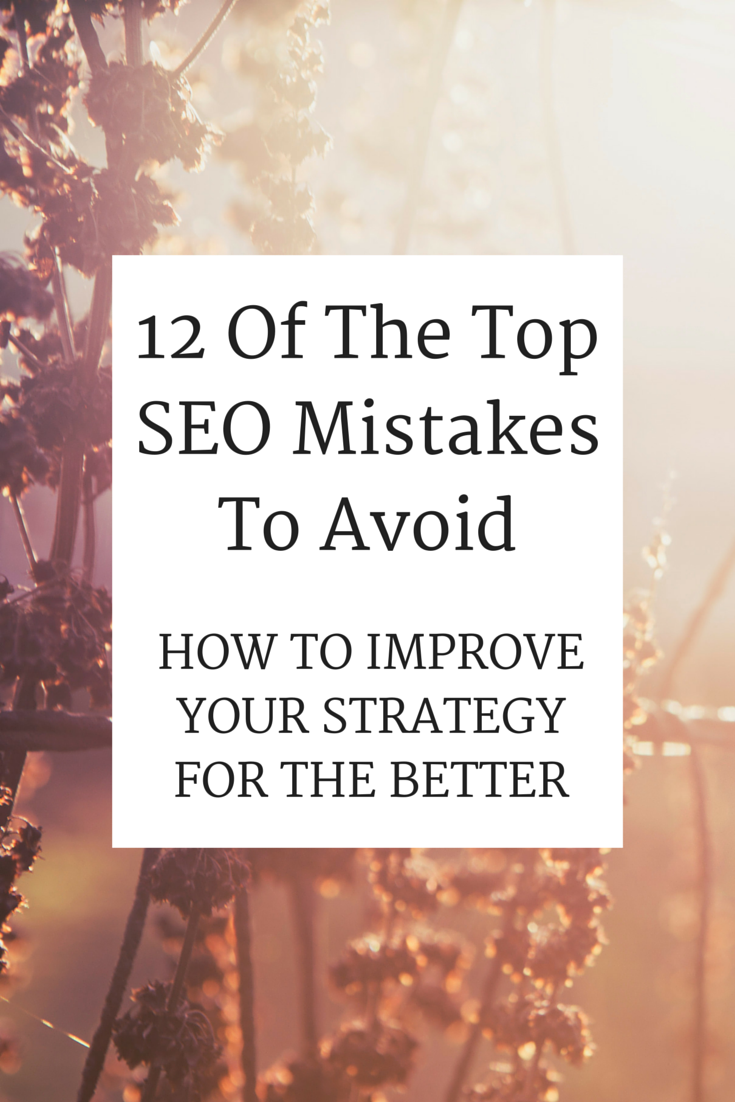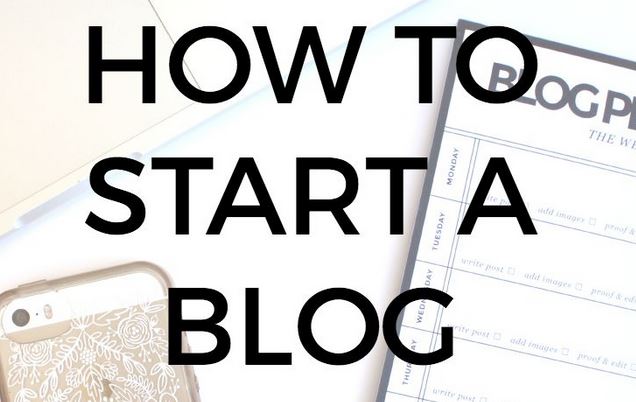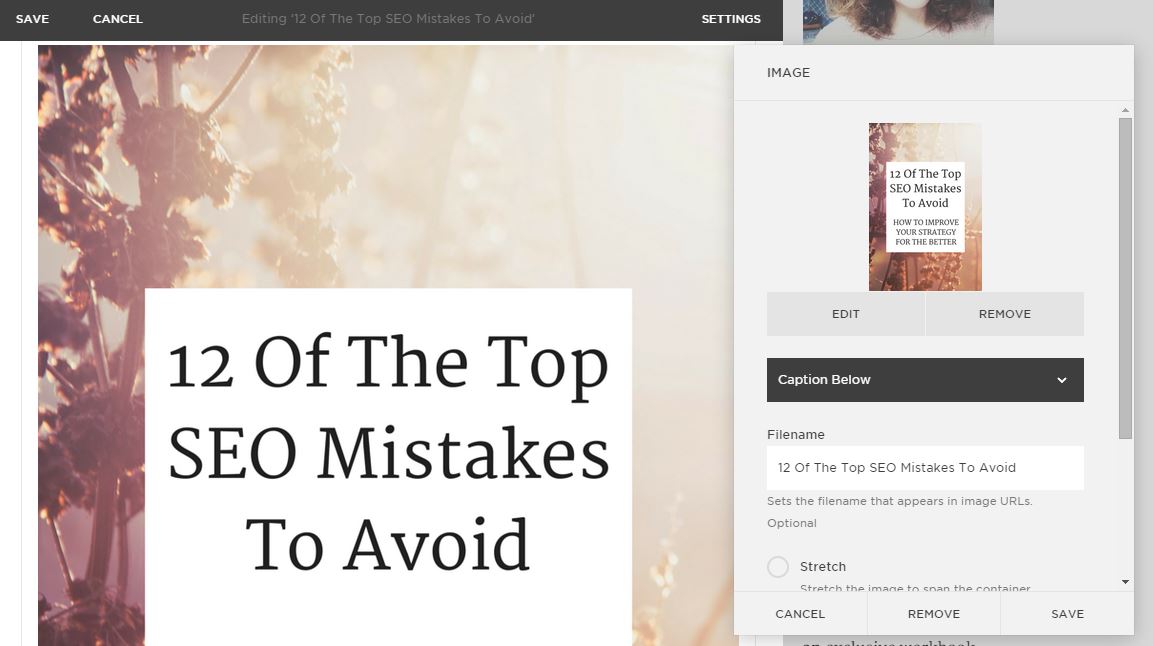12 Of The Top SEO Mistakes To Avoid
Three years ago, a lot of bloggers didn't know anything about SEO. It was a buzz word, making its way around the community. We were aware of it, but we didn't think it was that important and we definitely didn't understand it.
Fast forward to today and it's a completely different stories. Now, we all want to know about SEO. Whether it's in a Twitter chat, a Facebook group or a blog post, people want to know about it. We want to know how to use it and how to maintain it.
It's all well and good learning what SEO involves, and what you can do for your own strategy. But do you have any idea what you might be doing wrong? I was doing things wrong for a good six months when it came to SEO. Since then, I've learnt from my mistakes (and learnt from the pros!) to know what works and what doesn't. So today, I'm not going to share with you what you can do to boost your SEO strategy - I'm going to share the mistakes you can avoid, which are going to help you out a lot for the long term vision of attracting a community to your personal brand.
#1 Not Including Your Keyword in Your Headline & Body Content
When people search for a particular word or phrase, how do you think search engines get the results? They analyse all articles across the web and pull through the ones that include the words that have been searched for. So if you're not including keywords in specific parts of your content, you're setting yourself up to not be found.
80% of people will read your headline, but only 20% of people will go on to read the rest of your content. So if your headline doesn't relate to what your article is about, and doesn't specifically tell people what they can expect, why would they go on to read to the rest of your content? Plus, your introduction is your hook - it's what grabs people's attention and pulls them through. Your intro is one of the first things the search engines will see, so it's crucial for your keyword to be in one of your first sentences too.
Let's look at a headline example.
How many people will be searching the phrase, "how to start a blog"? LOADS. This is a perfect example of a great headline from The Blogging Brew - it tells people what to expect but doesn't give anything away and is exactly what someone would search for.
#2 Not naming your images
Abagail from Think Creative wrote a post about this recently and it's the perfect thing that relates to this point - go read it when you're finished here! People think you can brush past images. But did you know search engines don't analyse them?
Look back at my recent blog posts from last week. One thing they have in common (apart from my Weekend Reading series) is that they all start with text and then the image appears. This is because images don't count in search engines - unless you name them.
Here's how to do it in Squarespace, but it should be pretty easy on other platforms too. You just need to go to edit your image and add in a title for it where is says Filename.
This is a really effect strategy to use for ALL of your images. When you're saving them to your computer, use the headline of your blog post to name them. Then when you're uploading them to a post, where it says ALT Text, put the name in there too. This is a really effective strategy for boosting your SEO. It'll work - trust me.
#3 using keywords too often
I'm sure you'll have read posts on SEO before - I know it's one thing a lot of you are trying to understand and implement. So I'm sure you'll have also heard the phrase "keyword stuffing". If you haven't, don't worry - I'll quickly describe what it means.
Keyword stuffing means cramming a webpage with too many keywords, in order to manipulate a site's ranking in Google search results. It's quite obvious when this happens. They usually appear in a cluster and look out of place. I'll give you a quick example. Let's say for the introduction of this post, I wrote it using the keyword stuffing technique:
Today I'm going to talk to you about the main SEO mistakes you need to obvious. SEO is a tricky subject. There are lots of mistakes in SEO that you need to avoid. But SEO is...
See how many times I mentioned "SEO" in that paragraph? It was in every sentence. That's keyword stuffing.
Usually, there is a big emphasis on keyword strategy when it comes to SEO. But it doesn't work when you're trying to cram your keyword into every sentence. Best practice for a 500 word blog post to use your keyword between 3-5 times. That's all you need for search engines to recognise your content.
#4 buying links
Buying links is a very old school technique. I mean, they did this in the 90's - it's not something you see a lot of now.
I read an article recently that said buying links is perfectly fine, but I disagree. It's like buying followers - it can seriously damage your reputation. If you ever buy links you have to nofollow them. This means that you're telling the search engines not to count the links when it comes to your traffic, which means it doesn't damage your SEO. But a lot of people don't do this, which is where the problem lies.
At a Social Media & Search Analytics conference I attended in June, all the top SEO experts said don't buy links. I think we should listen to them!
#5 not having a mobile-friendly website
I wrote about this in a lot more detail recently - click here if you want to read it. As many of you probably know, Google announced an update to the way it ranks websites in April. They update their algorithms almost once a day, so they only announce an update when it's going to be big. The new feature was going to target websites on mobile search that didn't have a mobile-friendly website. For those that did, it was fine. For those that didn't, their rankings plummeted.
This blog is all about generating conversation - it's never been a place for telling you to do certain things. But if there's one thing I've learnt from working in the digital industry it's this - a mobile-friendly website is super super important. If you don't have one, I'd seriously think about putting it on your to-do list now.
#6 not spending enough time promoting your content
A lot of people used to work under the assumption that social media affected search rankings. But Matt Cutts from Google released a statement saying that the search engine didn't look at social signals. But what's happened now is this:
Social media is the new version of SEO.
So not only can your social media bio help you get found in search engines, but your links on social media can too, because they count as referrals. Links today aren't developed by buying them or asking for them. They're developed through writing original content on your website, that is then shared across social media. All your platforms, Twitter, LinkedIn, Pinterest, Facebook, Google+ and more - they all help search engines understand what websites are credible and which should be ranked. So if your content is shared a lot on social media, you're performing SEO right there.
This means that you need to share your content all the time. Don't just publish the link to your latest blog post and leave it there. This is a checklist I follow for publishing my own content to Twitter. The results are amazing.
- On the day of publish
- A few hours later
- The next day
- The next week
- The week after
- Next month
- Two months later
And remember, social media channels are search engines too. People don't just use Google anymore - they go to Twitter or another platform to find what they're looking for. If you're tweeting about things that relate directly to your site and brand, it's likely that a lot of people are going to discover you.
#7 not posting enough content
It's no secret that the more pages you have on your site, the more chance you have of including keywords and creating original content. This means that search engines have more pages to analyse, giving you more chance of increasing your rankings. So publishing blog posts frequently and consistently is crucial. Currently I publish three times a week - I would love to get this up to five or even seven! This isn't just good for SEO purposes, it's great for boosting your own brand presence too.
#8 posting low value content for the sake of posting
But then we get the other end of the spectrum. I find it so frustrating when I read articles and they say publish high quality content, without telling you what that is. Here's what I think high quality content consists of:
- In depth information
- Focuses on the reader
- Provides examples - screenshots etc
- Uses images
- Isn't afraid to go over 1000 words
- It's original
- It contains opinion
- It offers unique value that a reader can't get anywhere else
- It's real answers to real people's questions
If you're posting a 200 word post just because you need to get something on your blog, it's not worth doing. If it's rushed, it will be low quality - and Google doesn't like that. So really take your time to develop high quality pieces of content that you're proud of, whatever industry you blog in. If you're a food blogger, make your macaroni cheese recipe the most detailed ever. If you're a fashion blogger, do a really in-depth tutorial. There are so many great ideas you can come up with. All you need to do is put your mind to it.
#9 writing for search engines, not your readers
Over the years there has been a huge focus on SEO, almost to the point where people started writing for search engines instead of their audiences. But this is where things have changed - search engines now collect results based on what they think is going to give the searcher the best answer. So if you're not writing for your audience, this won't work.
Someone once asked me about SEO. We had a conversation and they said "well I'm making sure that my headlines and content are stuffed with keywords."
Oh dear.
If search engines like your content but your readers don't, what have you accomplished? Will you get comments? Social shares? You'll get listed in search engines, but you won't have done anything to benefit your brand, because your readers probably won't come back.
Would you rather have 150 new readers of a blog post that won't come back OR 35 readers who constantly spread the word about you?
I'd take the latter any day.
#10 focusing too much on one aspect of seo
Keywords, content, links, branding - there are a lot of things in SEO that we need to consider. Some people think they can just focus on one aspect of it. But SEO is an all rounder. For it to work, all parts of the puzzle need to be implemented. If you focus on keywords, you're letting your content and referral traffic suffer. If you focus on links, you're letting the more modern tactics suffer. Those who only focus on a certain part of SEO aren't benefiting themselves as much as they think. For it to work, it needs every feature.
#11 forgetting about landing page content
If you're like me, you'll have other pages on your website, and not just your blog. For instance, I've got my homepage, a contact page, an about page, plus a page to join my community. This provides me with many more opportunities to optimise my site for search engines.
But the trick is to not leave this static. These pages benefit from being updated at least every three months. They're the perfect place to add in more keywords and create original content - two big factors of SEO.
#12 not understanding seo
The final mistake you can avoid (and one of the most important) is this - trying to implement an SEO strategy without actually understanding how it works. Without a basic knowledge of it, you won't understand how to put it into practice. Plus, you definitely won't be able to measure your results, which is such a crucial thing too do.
I remember when I first came across the term SEO. It was in January 2013. Now? Well, I write about it and I've built a career with SEO in it.
I know it can be overwhelming. I know it doesn't make sense to you sometimes. But I promise that you will get there. It just takes time and patience.
SEO effects don't come into play right away. It isn't like getting a bunch of followers. It takes time for search engines to recognise your strategies. But once they do, it'll pay off.
so i wanted to ask you a question...
Would you like resources that will help you understand SEO and be able to implement it for yourself? If so, let me know by leaving a comment and sign up to join my community, to find out insider tips you won't get anywhere else.



